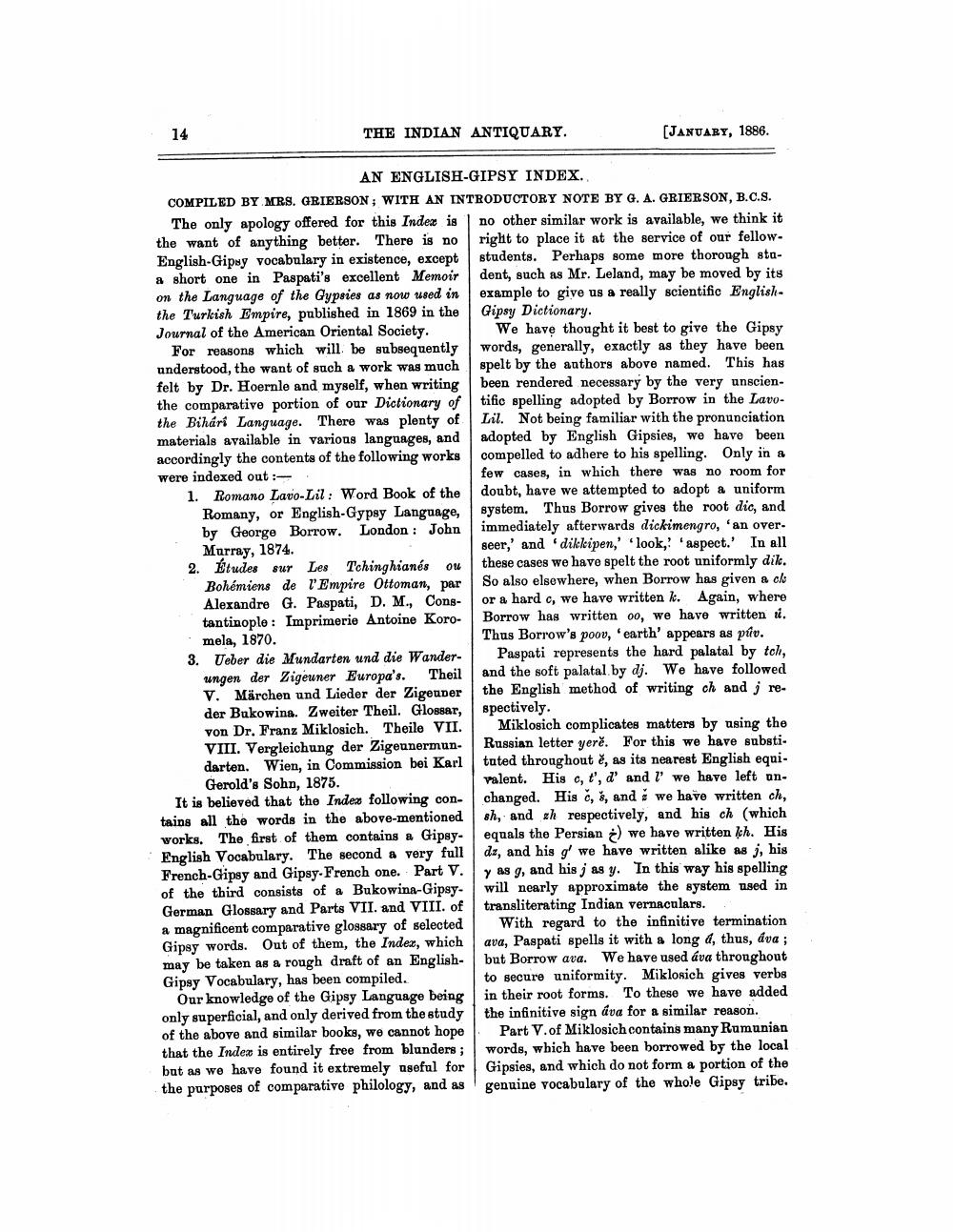________________
THE INDIAN ANTIQUARY.
(JANUARY, 1886.
AN ENGLISH-GIPSY INDEX. COMPILED BY MRS. GRIERSON; WITH AN INTRODUCTORY NOTE BY G. A. GRIERSON, B.C.S.
The only apology offered for this Index is no other similar work is available, we think it the want of anything better. There is no right to place it at the service of our fellowEnglish-Gipsy vocabulary in existence, except students. Perhaps some more thorough staa short one in Paspati's excellent Memoir dent, such as Mr. Leland, may be moved by its on the Language of the Gypsies as now used in example to give us a really scientific English the Turkish Empire, published in 1869 in the Gipsy Dictionary. Journal of the American Oriental Society.
We have thought it best to give the Gipsy For reasons which will be subsequently words, generally, exactly as they have been understood, the want of such a work was much spelt by the authors above named. This has felt by Dr. Hoernle and myself, when writing been rendered necessary by the very unscienthe comparative portion of our Dictionary of | tific spelling adopted by Borrow in the Lavothe Bihari Language. There was plenty of Lil. Not being familiar with the pronunciation materials available in various languages, and adopted by English Gipsies, we have been accordingly the contents of the following works compelled to adhere to his spelling. Only in a were indexed out:
few cases, in which there was no room for 1. Romano Lavo-Lil: Word Book of the doubt, have we attempted to adopt a uniform
Romany, or English-Gypsy Language, system. Thus Borrow gives the root dic, and by George Borrow. London: John immediately afterwards dickimengro, 'an over. Murray, 1874.
seer,' and 'dikkipen,' 'look,"aspect. In all 2. Études sur Les Tchinghianés ou these cases we have spelt the root uniformly dile.
Bohémiens de l'Empire Ottoman, par So also elsewhere, when Borrow has given a ole Alexandre G. Paspati, D. M., Cong- or a hard c, we have written k. Again, where tantinople : Imprimerie Antoine Koro- Borrow has written oo, we have written ti. mela, 1870.
Thus Borrow's poov, earth' appears as pav. 3. Ueber die Mundarten und die Wander- Paspati represents the hard palatal by toh, ungen der Zigeuner Europa's. Theil and the soft palatal by dj. We have followed V. Märchen und Lieder der Zigeuner the English method of writing ch and j re. der Bukowina. Zweiter Theil. Glossar, spectively. von Dr. Franz Miklosich. Theile VII. Miklosich complicates matters by using the VIII. Vergleichung der Zigeunermun- Russian letter yere. For this we have substi. darten. Wien, in Commission bei Karl tuted throughout ě, as its nearest English equi. Gerold's Sohn, 1875.
valent. His ct', d' and l' we have left onIt is believed that the Index following con- changed. His c, , and we have written ch, tains all the words in the above-mentioned sh, and xh respectively, and his ch (which works. The first of them contains a Gipsy- equals the Persian 2) we have written ļh. His English Vocabulary. The second a very full da, and his g' we have written alike as j, his French-Gipsy and Gipsy. French one. Part V. ly as g, and his j as y. In this way his spelling of the third consists of a Bukowina-Gipsy- will nearly approximate the system used in German Glossary and Parts VII. and VIII. of transliterating Indian vernaculars. a magnificent comparative glossary of selected | With regard to the infinitive termination Gipsy words. Out of them, the Index, which ava, Paspati spells it with a long d, thus, dva ; may be taken as a rough draft of an English- but Borrow ava. We have used ava throughout Gipsy Vocabulary, has been compiled.
to secure uniformity. Miklosich gives verbs Our knowledge of the Gipsy Language being in their root forms. To these we have added only superficial, and only derived from the study the infinitive sign áva for a similar reason. of the above and similar books, we cannot hope Part V.of Miklosich contains many Rumunian that the Index is entirely free from blunders; words, which have been borrowed by the local but as we have found it extremely aseful for Gipsies, and which do not form a portion of the the purposes of comparative philology, and as genuine vocabulary of the whole Gipsy tribe.




